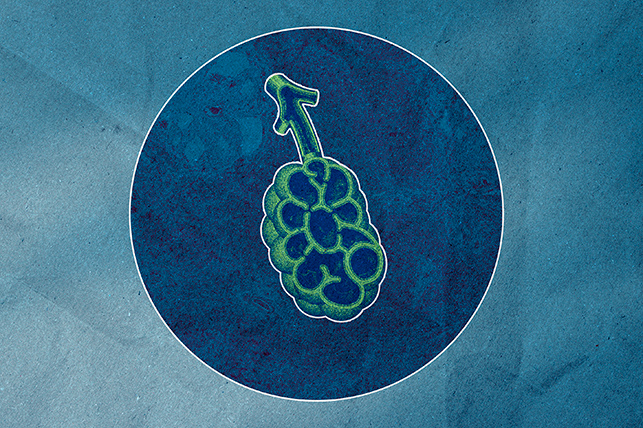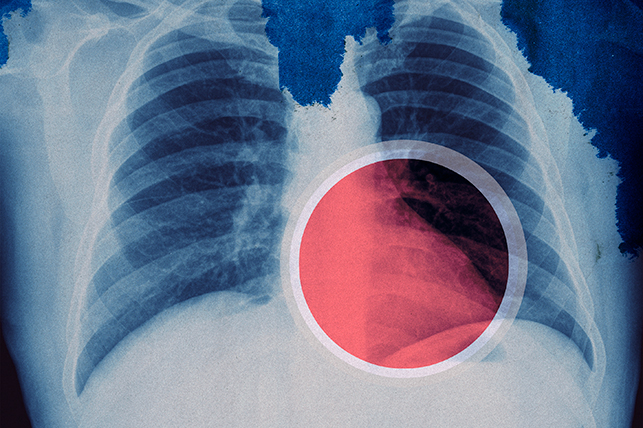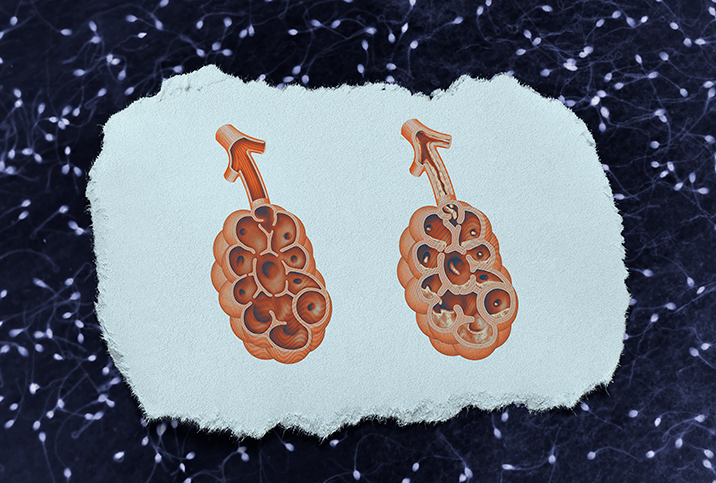How to Live With and Manage Cystic Fibrosis

At its core, cystic fibrosis (CF) is a genetic disease that touches the lives of the people who have it and everyone around them.
It is caused by the acquisition of a mutation in the cystic fibrosis transmembrane conductance regulator (CFTR) gene from both biological parents. The mutation must be passed on by both parents for CF to develop; this is called an autosomal recessive disorder.
The CFTR gene's function is to modulate the ratio of water and salt at the cell surface. When the ratio is off due to the gene mutation, which codes for an abnormal protein that is in the cell wall needed for maintaining this ratio, the result is production of abnormally viscous mucus, which can cause blockages in multiple organs, affecting their normal functioning.
People living with cystic fibrosis experience a barrage of symptoms—diminished lung capacity, insufficient digestion, issues related to fertility, liver disease, diabetes, pancreatitis, rectal prolapse, greasy stools and more—at varying levels of intensity.
Sometimes the presentation is mild and patients can go about their daily lives without too much consideration. For others, it is so debilitating they cannot continue their education or hold a job.
CF holds great potential to inhibit personal relationships, thanks in part to challenges with sexual dysfunction and reproductive health, which are inherently present in the disease.
Living with cystic fibrosis
No cure for cystic fibrosis exists, and overall life expectancy is shorter than that of the general population, but many patients with the disease live a full life and are now living longer thanks to medical advancements. CF is unique to each of the 162,428 people in the world with cystic fibrosis, according to Jo Armstrong, the CEO of Cystic Fibrosis Australia.
In other words, there is a wide range of disease severity and an equally wide range of ways to cope on a day-to-day basis.
Regardless of whether a person needs frequent intensive care or can manage most symptoms noninvasively, they have a long road ahead—for them and their loved ones. Because of this, they need lots of support to achieve the best possible outcome and come to terms with their illness in a constructive manner.
Management of a chronic health condition takes a team.
Dating and talking to your partner
If you have cystic fibrosis, being in a relationship means something different than it does for people without CF.
"Whether and how to disclose that you have CF to a romantic partner is a personal decision," said Traci M. Kazmerski, M.D., an assistant professor of pediatrics at the University of Pittsburgh. "It can feel overwhelming to explain what CF is and the importance of doing daily therapies to someone who is not familiar with CF."
She added that being open and honest about having the condition may help deepen the relationship and boost comfort levels because the person is sharing an important part of themselves that can affect both partners in many ways.
To aid the discussion, Kazmerski advocated using a reputable online resource, such as Cystic Fibrosis Trust. Try to cover all the important bases, such as family planning, physical safety and emotional support. Trying to tackle a disease on your own can negatively affect your well-being and undoubtedly impact romance.
Instead, work together toward the goal of optimal health.
Joint disease management efforts are particularly crucial from a sexual standpoint. Though people with CF have unimpeded desires for intimacy, the physical and emotional tolls affect their private lives.
Fatigue stemming from various treatments and the disease's psychological burden can impede the ability to make a connection with someone, and problems with breathing can make sex cumbersome.
Someone with CF may eschew relationships altogether to avoid these issues, but with the right partner and proper precautions, they can be just as happy as someone without it.
Prevention and aftercare
Both Armstrong and Jyoti Matta, M.D., a pulmonologist affiliated with RWJBarnabas Health Medical Group in Jersey City, New Jersey, suggested people should get tested for the CFTR gene mutation. Those who have been identified as carriers should undergo genetic counseling if they want to have children. Knowledge of carrier status and a genetic workup are crucial to prospective parents preparing for the challenges associated with CF, and counseling is a pivotal action to take. From there, levels of aftercare are dictated by CFTR mutation severity.
Matta advocated enrolling in a cystic fibrosis center to assess the gravity of the diagnosis and get started on the appropriate treatments. Kazmerski pointed out that because CF impacts many organs, there are several common treatments to target specific symptoms. She said CFTR modulator drugs aim to fix the underlying genetic defect for up to 90 percent of people with cystic fibrosis, which improves lung and overall health function.
The best course of action to break up thick mucus in the lungs is to practice airway clearance treatments several times a day to prevent long-term damage. This treatment often takes the form of inhaled medicines administered through a nebulizer. Establishing a fitness routine boosts respiratory and overall health, especially when paired with a specialized diet.
"For gastrointestinal manifestations of CF, about 85 percent of people with CF take pancreatic enzyme replacement therapy to help them digest food," Kazmerski said. "If people with CF have other symptoms, such as diabetes or liver disease, they will have to take other medications as well."
Though it's possible to find success with predominantly home-based treatments, not everyone is so lucky. Armstrong said some people undergo intensive physiological treatment and hours on a respirator and take up to 80 tablets a day to manage their condition. Many people with cystic fibrosis also undergo surgery, such as lung transplants, so following a treatment and recovery plan is paramount for continued results in these instances.
Supporting someone with cystic fibrosis
Being there for loved ones with chronic illnesses is strenuous. Families of patients with CF experience difficulties upholding typical interpersonal relationship patterns and having familial needs met. This becomes even trickier when siblings are involved because there needs to be a balance of attention and involvement with all children. It's easy to prioritize a sick child over a healthy one, but don't let anyone be neglected.
Caregivers need care, too. You have to be your best self to optimize the help you provide. Protecting yourself and anyone who may come into contact with the patient against infections and other illnesses is of extreme importance. The fragility of their health status puts them at a heightened risk for subsequent conditions.
Make sure the household members stay up to date on vaccinations for additional security.
Recognize that there is only so much you can do on your own and encourage patients to seek outside help when needed. Use discretion when talking about cystic fibrosis-related anecdotes, as they can be either helpful or harmful depending on the audience. Sometimes just knowing there are people in your corner can make all the difference in the life of someone with CF.
If you feel lost or need some extra guidance, finding your own assistance could be a good strategy.
Resources for patients and caregivers
Whether it's you or someone dear to you who has cystic fibrosis, one of the best things to do is educate yourself. Undoubtedly, the treatment team of medical professionals can offer substantial information, but it's important to engage in self-guided investigation, too.
An established authority on all things CF is the Cystic Fibrosis Foundation (CFF), which offers resources related to research, treatment and guidance for people affected by the disease. Cystic Fibrosis Australia is another strong resource.
Matta recommended the cystic fibrosis treatment center within RWJBarnabas Health, the Cooperman Barnabas Medical Center. The Center for Young Women's Health at Boston Children's Hospital offers a series of guides that covers topics related to sexual and reproductive health.
Other significant resources include the CF-centric Bonnell Foundation, community-geared Claire's Place Foundation, and guides to insurance information such as those from the Cystic Fibrosis Care Center and HealthCare.gov.


















